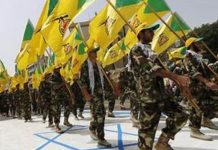PRISTINA, FEB 9 (AFP/APP): Voters began casting ballots in Kosovo elections Sunday in a contest that pits combative incumbent Prime Minister Albin Kurti’s quest to stamp out Serbian influence against a fractured opposition’s vow to boost the economy.
Kurti and his Vetevendosje (“Self-Determination”) party (VV) have campaigned on their efforts to dismantle the remaining Serbian institutions in Kosovo while expanding the government’s reach to Serb-majority areas.
Those pledges appear to have been well received by large swaths of Kosovo’s ethnic Albanian majority, with one of the few available polls projecting that VV was on course to capture roughly half of the vote.
Kurti’s campaign has sought to drive home the message, insisting the government is in greater control of Kosovo’s territory than at any other time since independence.
“I thank all the citizens of Kosovo who voted so far and encourage everybody to vote. Exercise your democratic right to make your voice heard,” said Kurti as voting got under way across Kosovo.
Animosity between Kosovo and Serbia has persisted since the war between Serbian forces and ethnic Albanian insurgents in the late 1990s.
Serbia has steadfastly refused to acknowledge Kosovo’s declaration of independence in 2008.
Since the war’s end, remnants of Serbian government institutions continued to provide services — ranging from health care to education — to Serbs inside Kosovo.
But in the past year, Kurti has sought to end that status quo.
– Shadow state –
Kosovo’s authorities have effectively outlawed the use of the Serbian dinar, closed banks and shuttered the post offices where Serbian pension payments were cashed.
Belgrade-backed government and tax offices have also been closed and Serbian car plates banned.
The moves have heightened the uneasy relations between Kosovo’s ethnic Albanian majority and its Serb minority in the run-up to the polls.
Once known for antagonistic stunts such as letting off tear gas in parliament, the VV has grown from a street movement led by Kurti in the 2000s to Kosovo’s dominant political party.
Kurti’s government is the first to finish its full term in office since the breakaway Serbian province declared independence.
But Kurti’s rule has been turbulent, marked by regular unrest between Serbs and ethnic Albanians.
Tensions spiked after EU- and US-backed negotiations between Kosovo and Serbia all but collapsed in March 2023.
In the aftermath, NATO peacekeepers were assaulted by rioting Serbs, a deadly armed standoff in the north sent regional tensions soaring and an explosion targeting a canal vital to Kosovo’s power plants late last year saw Kurti blaming Belgrade.
Throughout the unrest, Kurti has remained unwavering, even if it meant running afoul of Kosovo’s vital allies in the United States and Europe.
But his supporters have praised his vision.
“You can see the things (Kurti) has done. He is irreplaceable,” Zek Kurtaj, 40, told AFP after landing at the Pristina airport on Saturday ahead of the vote.
– ‘Critical indicator’ –
Others suggest Kurti’s actions may have been overly disruptive.
Kurti “has been repeatedly accused by opposition parties of delivering little, defying the international community, and complaining about Serbia while missing out on opportunities to build infrastructure and develop Kosovo economically,” wrote Jonathan Moore, an analyst from the Atlantic Council’s Europe Center.
“The results of this election will be a critical indicator of Kosovo’s future.”
Several of Kurti’s rivals — which include more than two dozen opposition parties in the contest — have sought to focus on Kosovo’s economic uncertainty.
Kosovo remains one of the poorest economies in Europe, with roughly 12 percent of its population emigrating since 2011.
Many voters said economic issues were at the top of their minds as they cast their ballots.
“We believe that change will come. I am thinking about employment, the economy, and all other sectors,” Remzije Halimi, a teacher, told AFP.
“My main concern is improving the education system and creating more opportunities for young people like me,” added first-time voter Morena Ismaili.
In the run up to the vote, Xhavit Haliti of the right-wing Democratic Party of Kosovo — considered one of the VV’s strongest opponents — has slammed Kurti for fraying ties with Washington and Brussels.
Meanwhile, the Democratic League of Kosovo led by economist Lumir Abdixhiku has vowed to increase salaries and boost pensions.
In ethnic Serb areas, the Belgrade-backed Serb List party has campaigned on familiar vows to protect the rights of Kosovo’s dwindling Serb minority.
“Any Serb who does not vote tomorrow or who votes against the Serb List de facto gives their vote to Kurti and to those who obey him,” party leader Zlatan Elek told local media.
Voting began at 07:00 am (0600 GMT) and will end 12 hours later, when exit polls are expected.












